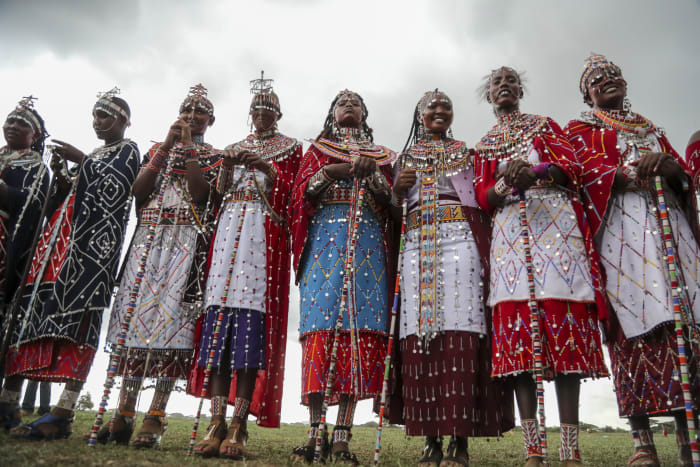Kimana Sanctuary – Kenya’s most famous community abandons hunting lions with spears in a biannual event called the Masai Olympics.
Famous for their colorful clothing, the Maasai are primarily nomadic and live near Kenya’s most visited wildlife parks. Maasai attacks on wildlife have often been cited as a threat to some animal populations.
The traditional rite of passage for a young Maasai man was to kill a lion with a spear to prove his masculinity and gain the name and admiration of a warrior among young women.
But Maasai elders like Mingati Samanya, 69, are blazing new trails for young warriors in the community, also known as Morang.
As a young man, Samanya killed two lions to prove he was a man. That is why he received the “Lion’s name” Mingati in Ma’a. His birth name is Naiganya.
Samanya is now encouraging Moran, a Maasai tribe, to pursue alternative ways of proving his masculinity, such as participating in athletics, javelin throwing, and Maasai jumping competitions during the regional Olympics. is one of
On Saturday, young men and some women competed for medals and cash prizes at the Kimana Nature Reserve at the base of Mount Kilimanjaro.
“In our time we killed a lion, but it did not bring us any profit. Now when Moran throws his spear and runs away, we get money. Before, we got nothing. It was just poverty instead of supporting our family,” Samanya told the Associated Press.
Vivian Ganini, who attended the Maasai Olympics in a traditional wedding dress with a colorful beaded necklace, said today’s girls prefer modern morans.
“At least if they run, I can make some money and take care of my wife and kids,” said the 22-year-old mother of two.
The Maasai Olympics are also part of a broader conservation effort.
“The cultural aspect of warriors trying to kill lions to become famous is addressed by this event,” Big Life Foundation’s Craig Miller told The Associated Press.
Millar said lion populations in the Amboseli ecosystem, which includes the Kimana Nature Reserve, have increased tenfold over the past two decades. He attributes this to various initiatives such as anti-poaching law enforcement and compensation programs to reduce the loss of Maasai-owned livestock to predators.
But other dangers remain for wildlife. Hundreds of elephants, wildebeests, zebras and other animals have died in parts of Kenya and the wider East African region after four consecutive seasons of lack of rain. Recent reports By wildlife authorities.
These prolonged dry seasons increase the risk of human-wildlife conflicts, but communities living near parks are encouraged to protect and coexist with wildlife.
Baba Sithon, an elder who lives near the Kimana Conservation Reserve, said, “I understand the benefits of wildlife to the national economy and the direct benefits to us Maasai who live near the park. Animals drinking from a water dish with livestock.
Copyright 2022 The Associated Press. All rights reserved. This material may not be published, broadcast, rewritten or redistributed without permission.
https://www.local10.com/news/world/2022/12/12/in-kenya-some-maasai-turn-from-lion-killing-to-olympics/ In Kenya, some Maasai convert from lion-killing to Olympics
